Nathan Lively's Blog, page 31
June 14, 2014
What the Hell Is AV Integration?
In this episode of Sound Design Live, I speak with writer, educator, and AV integrator Josh Srago. Srago has worked in recording, broadcast, television, concert sound, corporate events, and AV integration. In our interview he claims that having no specific focus was the best career choice he ever made, and walks me through the life cycle of an AV integration project. Srago also talks about the value of a CTS certification from InfoComm, and explains to me why VGA is still so popular in corporate events. Make sure you stick around through the end when we go head to head on the question: What is the real goal of sound system measurement?
Details from the podcast:
 All music in this episode by Josh Srago and Munch Is Missing
All music in this episode by Josh Srago and Munch Is MissingCheck out Srago’s course Audio DSP Fundamentals at InfoComm on Thursday at 10:30am.
Srago’s article: Have you measured your room recently?
San Francisco State University, Ex’pression College, Full Sail
JK Sound, TOA, Integrated Communications Systems
International Brotherhood of Electrical Workers Union
InfoCOMM, CES, CEDIA
CTS = Certified Technical Specialist
AVB, AVnu Alliance
VGA, 5-wire (aka 5-BNC), HDMI, Thunderbolt, Display port, Mini display port
My interview with Dave Swallow
Quotes
“The best decision I ever made in my career, period, was to not have a specific focus.”
“I didn’t like studios. I didn’t like sitting there tuning a tom drum for 45 minutes. It drove me nuts.”
The life cycle of an AV integration project
Client
Construction company.
Needs Analysis
Responsible: Presales Engineer, Project Manager, Independent Consultant.
Design
Responsible: Project manager, Presales engineer.
Check equipment model number and prepare bid.
Bid
Public: Lowest bid wins.
Private: Interview process to defend design.
Equipment purchase
Collaborate with electrical contractor and head of IT for power and network connections.
Collaborate with general contractor for aesthetic goals.
Collaborate with furniture manufacturer for equipment integration.
Build
Union may handle all of this.
Program
Equipment functionality based on needs analysis.
Punch
Consultant returns for final checklist.
This article What the Hell Is AV Integration? appeared first on Sound Design Live. Sign up for free updates here.
P.S.
Best Tips For Building A Career In Pro Audio
Balls Of Steel: 10 Surprising Tips For Live Audio Engineer Training
One Simple Reason I Chose To Be An Audio Engineer Major

June 4, 2014
In 5 Years Time

 Where do you want to be in five years?
Where do you want to be in five years?Think big. What’s your vision, free of all limitations?
Touring the world at FOH with Sigur Ros, making $70,000/year with a month of vacation?
Running your own AV Production Company designing complicated sound systems and earning $250,000/year?
Designing for Broadway with a salary of $85,000/year and a big NY condo?
 Where are you now?
Where are you now?When you look down the path you are on right now, where do you see yourself in five years? Be brutally honest. If I asked you to bet on your own success, how much would you wager?
If I’d had to bet on my own success during the period I described in my last post, I wouldn’t have wagered a lot. I was drifting from one small job to the next and just hoping to make it big. Over time I developed a better vision of my career and figured out what it takes to thrive in this business. Today, if you ask me to bet on my success I will go all-in.
If you want to deal your own winning hand, I can help you make the jump from the here and now to your own big vision. Up the ante on your dreams.
Sign up for a free strategy session now.
This article In 5 Years Time appeared first on Sound Design Live. Sign up for free updates here.
No related posts.

May 30, 2014
Do You Have A Clear Path To Pro Audio?


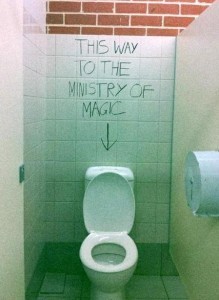 When I was a kid, my dad would take me to loud bars and R-rated movies. This was before YouTube and MySpace, so we would just pick a show and go without knowing what we were in for. The shows were hit and miss, but a seed was planted that led to my passion for music, recording, and live events.
When I was a kid, my dad would take me to loud bars and R-rated movies. This was before YouTube and MySpace, so we would just pick a show and go without knowing what we were in for. The shows were hit and miss, but a seed was planted that led to my passion for music, recording, and live events.
In high school I had two rock bands, and they provided my first experiences of euphoria and timelessness. I imagine most other teens discovered those feelings through sports or sex; I decided to study music.
My first job at university in Denton, Texas was recording student concerts. I was attracted by the entire process; the microphones, the speakers, the cables. I’m sure you can relate. I was honestly more excited to listen to the concert recording than the concert itself. I wanted to take it to the next level, so I transferred to a school in NYC where I could study recording.
From the beginning I realized that I was a little bit different. While most students just wanted to produce their own music, from the very beginning I wanted to work on other people’s projects as well as my own. I wanted to become a Pro Tools power user and understand exactly how everything fit together in the studio. Being the best sound engineer in the world would be my ticket to success, so I needed to be able to solve any technical or musical problem during a recording session.
The recording studio is where I had my second experience with timelessness. Working behind the board recording, I felt as though I had control over an entire world. It was magical and I wanted more. Things went well and I got a few clients. Rappers, rock bands, and some experimental theatre. I started to realize that working in audio was not all technical skill and musical ability. It had an awful lot to do with patience and charisma.
When I got out of school I continued doing sound design for theatre with some concert sound and recording thrown in there, but I didn’t really care because I had fallen in love and decided to move to Portugal. Where’s that? Isn’t that in Spain somewhere?
I visited all of the recording studios I could find in and around Lisbon and still went broke. That’s when a big scary realization hit me: this job is not a meritocracy. You move forward with personal referral and social proof. My plan to be the best sound engineer in the world was falling apart. I didn’t know anyone in Lisbon and they didn’t care that I had gone to school in NYC, or about anything else on my resume.
I went home and made a list of all of the music venues in Lisbon and started to visit them in alphabetical order. I had pretty much lost hope by the time I got to the last one, Galeria Zé Dos Bois. I went to a show and afterwards approached the guy behind the board. Our conversation went something like this:
NATHAN: Hi, I’m Nathan. I’m a sound engineer, too.
NATXO: Hi…I’m not. I’m the gallery director. Hey, do you want to come and work tomorrow night? We could use your help.
NATHAN: Sure!
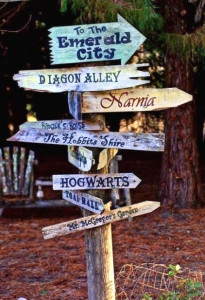 Little did I know I had done the best thing I could do for my career. Not only is Galeria Zé dos Bois is a well-known venue in Lisbon with local and internationally touring acts, but they needed someone to design and install a new sound system. I could feel my value growing. The contacts that I made at that job that led to every other job I got in Portugal, including working at the National Theatre and touring to Macau. If I had sat down and decided what I wanted out of job in Lisbon before visiting music venues randomly, I would have cut my search time in half.
Little did I know I had done the best thing I could do for my career. Not only is Galeria Zé dos Bois is a well-known venue in Lisbon with local and internationally touring acts, but they needed someone to design and install a new sound system. I could feel my value growing. The contacts that I made at that job that led to every other job I got in Portugal, including working at the National Theatre and touring to Macau. If I had sat down and decided what I wanted out of job in Lisbon before visiting music venues randomly, I would have cut my search time in half.
There were euphoric moments and great shows, but once again I found myself wanting to take it to the next level. I wasn’t making enough money, and the shows I was working on weren’t challenging me anymore. Feeling stuck led me to the third big move of my life, to Slovakia. This might sound really scary: leave everything and everyone you know and move to a foreign land! Or, if you’re like me, this is where you learn that you love starting over. Personally, I love researching a new location and developing a strategy for finding work, learning the city, and making it my own.
Working in Slovakia was pretty different from New York and Lisbon. No immigrants, and few English speakers. But you know what was the same? Finding work and building a network from scratch. Only this time it took about half as long. By networking and knocking on a lot of doors I got in with some good production companies and learned a lot about working with bigger systems and live orchestras.
After a year in Slovakia I became infatuated with sound system design and optimization. I was studying Bob McCarthy’s seminars and books and decided that that was my calling in life — I was ready for a new next level. I told everyone, quit the production companies, and moved back to Texas.
Over the next few years I had many more lessons and realizations about working in pro audio, and they all added up to this: I never truly defined where I wanted to go with my career so I had no strategy to get there. That’s what all of the moving around was about. I would make weak proposals, blast into action, and then crash and burn when I ran out of enthusiasm. I’d been throwing my hat over the fence for a long time and it had taken me all over the world, but that non-strategy was getting old.
I still loved working in audio, so I persevered. I moved to San Francisco and worked in theatre and concert sound while I applied for jobs at Meyer Sound. I started a podcast, published an eBook, and wrote articles. I started a local Meetup group for freelance engineers and helped other people make connections that got them work. It felt great! Through my podcast I found someone a job in the UK. Worldwide success! ;) Meanwhile, I was learning about online marketing and website design. I thought, “Wow, I love working on this stuff, and I bet I could do it for other people.” I had a couple of clients doing content management and web design, but nothing took off.
 Then one day it hit me. What if I could combine everything I’ve learned about audio, traveling, working, self promotion, job hunting, online marketing, productivity, health, and happiness into a business? What if I could help other sound engineers overcome the challenges that I had faced throughout my career?
Then one day it hit me. What if I could combine everything I’ve learned about audio, traveling, working, self promotion, job hunting, online marketing, productivity, health, and happiness into a business? What if I could help other sound engineers overcome the challenges that I had faced throughout my career?
What if I had had someone to guide me at the beginning of each new project? To keep me true to myself and provide a system for organization and strategy? I had so much energy at the beginning of each project I took on that I thought nothing could stop me, but energy and enthusiasm by themselves weren’t enough. Direction, psychological preparation, and accountability all would have helped.
All of this hit me while making plans for a big project. I wanted to build hardware and software. Instead of moving halfway around the world to reach a new level, I was going to build a feedback suppressor and a wireless speaker. But was my enthusiasm and energy really enough for a multi-year commitment? When I sat down to think about why I wanted to chase that project, I realized that it wasn’t about hardware or software. What I really wanted was to help other sound engineers navigate difficult situations.
So instead of learning how to write software, I sat down and wrote a business plan. For the first time in my career I have a clear goal, and I’m excited to share it with you. Since I began my podcast in 2011, people have brought me their challenges with money, overwhelm, technical training, and client attraction, and I’ve really enjoyed bringing clarity to every one of those situations. I have a wealth of experience and skills to draw on to create meaningful change in audio professionals’ careers, and I want to share it with you. As a first step, I am offering free 45-minute strategy sessions until June 6th.
An out of work sound engineer came to me with her need for technical training and instead we found a highly valuable business she could start immediately.
A busy sound designer needed help focusing his work and we defined an exciting niche to exercise.
A successful mixer wanted more family time and we came up with job and business ideas that would allow him to see his kids regularly.
I know: everyone would rather talk about the intricate details of sound system tuning. These are one on one consulting sessions so sound system tuning skills can definitely be one of the goals that we work on, but right now we need to talk about the elephant in the room. If you want to get anywhere with your career, you’ve got to work on more than your technical skills. This is where the story gets serious.
Are You Ready To Take It To The Next Level?
I don’t like being serious. Girls just wanna have fun. Jokes, beer, games, yay!
But, we have to have a serious talk about two things that are going to change your life.
#1 – You need to make more money
Being a sound engineer is tough, and you are not taking it seriously enough. I don’t mean mixing shows and designing sound systems and recording symphonies; that’s the easy part! I mean the business part. That’s the part that you’re still treating as a hobby, and that is why you are barely able to pay your bills working for the same crappy clients who don’t pay, don’t respect your work, and bring you unfulfilling projects. There’s an attitude in this industry that says “you should be happy to even be here“, and while that may have served you while you were getting started, it’s time to move beyond that.
You need to start taking this seriously so that you can do the work you love AND be rewarded for it. I don’t mean you need to be a hard ass and make enemies, I mean you need to get clear about what you want your business to do for you and develop a strategy to get you there. It might be an awesome job, but it is not a magic lamp. You may want to just do your art and make the girls shake their booties, but if you don’t have a plan, you’ll starve.
Surviving is not enough. Think bigger. How will the work you’re doing now play out in a year? Two years? Five years? And don’t say that you’ll be the greatest record producer ever, because George Martin was 36 before he met The Beatles, but was running a successful record label before that. You will find satisfaction in your work as long as you seek out your true potential and find your best fit in the industry.
Between now and June 6th, I will be offering a limited number of free 45-minute strategy sessions to help you get clear on these topics. Sign up now.
#2 -You need to have more fun
The audio industry is famous for producing unhappy, unhealthy social deviants and thrill seekers. Consider how your current work conditions are affecting your health, happiness, and goals for the future. Maybe you’ve heard people say, “It all part of the job” or “It comes with the territory.”
Is that really true, or is that just what you’ve experienced so far? Have you even considered the possibility that you can define your ideal work conditions, and then seek them out? What about a job where you have fun, fulfill your potential, and meet your financial goals? That all sounds perfectly reasonable to me. You just need to find your best fit.
So what does best fit mean?
You are directing your own life.
You are steadily mastering your craft.
You are serving something larger than yourself.
The money is right.
You wake up in the morning excited to meet new challenges.
Every year you add more fun to your business
These are the most important factors I’ve found in judging a good fit. If you wake up already regretting the work you have ahead of you, please decide today, right now, to make a change. I’m taking a stand for you and your success by offering a free 45-minute strategy session to help you get clear about what you want and how to get it. You will complete the session with greater clarity on your vision, the challenges you face, the strategies needed for success, and your next action steps. There is no obligation or pressure to continue beyond this initial session.
SIGN UP NOW
This article Do You Have A Clear Path To Pro Audio? appeared first on Sound Design Live. Sign up for free updates here.
P.S.
Best Tips For Building A Career In Pro Audio
Balls Of Steel: 10 Surprising Tips For Live Audio Engineer Training
From Surviving To Thriving

May 23, 2014
From Surviving To Thriving
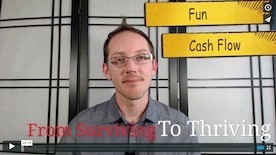

Link #1: Schedule a free 45-min strategy session
Link #2: More details about the program
Hi, I’m Nathan Lively. Some of you have been listening to my podcast for 3 years and some of you just started reading my articles, but all of you know that I care deeply about helping audio professionals master their craft and build their careers. Now I have something special to offer you, specifically. I am launching a 12 week business coaching program next month. It’s the first program of its kind which is why I am only enrolling 10 people for this pilot group, and why I am only sending this video to you, the readers on my mailing list.
Description
It’s called From Surviving To Thriving, and its intention is to help you reach new levels of fun and cash flow in your thriving business as an audio entrepreneur. If you are ready to take your business to the next level, click this link to schedule a free 45 minute strategy session where I will help you to get clear about what you want and how to get it.
Who is it for?
I like using the words audio professional and audio entrepreneur, but they are basically a more inclusive way of saying sound engineers, sound designers, and AV technicians who would like to create a thriving business in pro audio. So if you match any of those descriptions, this is for you.
Why am I doing it?
This course is important because it’s easy for audio professionals to suffer from limiting beliefs. Have you ever said anything like:
I’ll never be able to make a living and do the work I love.
If I tour a lot I won’t have good relationships, unless I go out with the monitor engineer.
The UK is a terrible place to do sound. I’ll never move to NYC or LA where all of the jobs are.
Or maybe you’ve had several jobs in audio, but quit them because there was no clear way to go further. Most people haven’t figured out what they really want to do so they act without a goal in mind and quickly become burned out and unmotivated. Ask me how I know.
Or maybe you know what the next step is, but you lack the confidence to take it.
These are all problems that my program is designed to solve.
Who is Nathan Lively?
The difference between me and other sound engineers is that I’ve tried a lot of different ways to market myself, sell my services, and build my career across many different fields in the audio industry, and on large and small events across three different countries. Basically, I’ve spent my career as a guinea pig for this program. I bring that breadth of experience to the coaching environment to create specific advice and guidance for the next steps in your career.
The difference between me and other coaches and consultants is that I have worked in many different fields in the audio industry on large and small events across three different countries.
How Does It work?
From the conversations I’ve had so far, I assume that most of you haven’t been part of a business coaching program before. So, if you’re curious about the nuts and bolts of how the whole thing works, click this link and it will take you to a page that goes into more detail.
The Result
If you want more fun, more cash flow, and to wake up every morning certain that you are on the path to career satisfaction, then this 12 week coaching program may be a perfect fit for you. Click this link to schedule a free 45 minute strategy session where I will help you to get clear about where you are heading and how to get there.
This article From Surviving To Thriving appeared first on Sound Design Live. Sign up for free updates here.
P.S.
Make A Living As A Sound Engineer, Part Two: How To Get Played
Learn from the Sound Engineers for Tori Amos, Prodigy, and The White Stripes Online
How Much Do Live Sound Engineers Make?

May 18, 2014
Live Sound Survival: Big Sound Out Of Small Systems
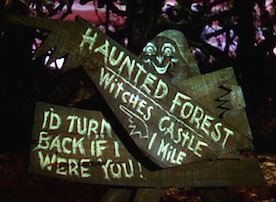

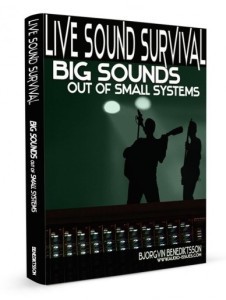 Live Sound Survival is an eBook that Björgvin Benediktsson sells on his excellent blog, Audio Issues. He is definitely passionate about helping sound engineers like you and me master our craft, but he also scares the shit out of me. This seems to be a common theme in pro audio media–more on that later.
Live Sound Survival is an eBook that Björgvin Benediktsson sells on his excellent blog, Audio Issues. He is definitely passionate about helping sound engineers like you and me master our craft, but he also scares the shit out of me. This seems to be a common theme in pro audio media–more on that later.
Is the book for me?
Maybe. If you are a beginner or hobbyist working on open mikes or birthday parties, then yes. If you already work regularly in professional audio, then no. The book doesn’t get into theory or explanations of science, it just provides directions and short recipes for specific situations.
That being said, this book does a great job of introducing general ideas on best practices and standards of quality. For example, instead of telling you exactly which vocal microphone to use, Benediktsson explains that there is no bad microphone. Benediktsson doesn’t explain why he chooses certain mikes or speakers in his templates, but you can trust that if you use them everything is likely to work out fine.
This is a great quick-start guide for someone who wants assistance plugging things in. I can imagine a musician who wants to put together a live system for herself or an event producer who wants to take their show on the road finding it useful.
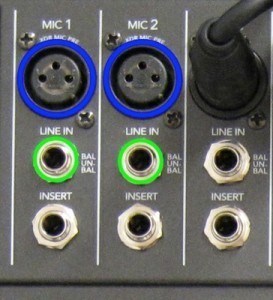 Unfortunately, some things Benediktsson writes in an effort to simplify and explain concepts are just plain wrong. For example, in the section on mixers he writes that the line input is for guitars. That’s a complete level and impedance mismatch! Electric guitars with passive pickups are expecting 1MΩ while most line level inputs are rated at around 10KΩ. We’re talking serious high frequency loss. You should only do that in a pinch. In our interview he explained that he is writing for an audience that is always in a pinch. I get where he’s coming from and I can even imagine a scenario where it makes sense, like with an active guitar pickup 6ft from the mixer, but I still find it a bit irresponsible.
Unfortunately, some things Benediktsson writes in an effort to simplify and explain concepts are just plain wrong. For example, in the section on mixers he writes that the line input is for guitars. That’s a complete level and impedance mismatch! Electric guitars with passive pickups are expecting 1MΩ while most line level inputs are rated at around 10KΩ. We’re talking serious high frequency loss. You should only do that in a pinch. In our interview he explained that he is writing for an audience that is always in a pinch. I get where he’s coming from and I can even imagine a scenario where it makes sense, like with an active guitar pickup 6ft from the mixer, but I still find it a bit irresponsible.
A couple of more complaints: His explanation of channel gain makes me cringe. He also recommends a graphic EQ for system tuning and feedback reduction, which we know is a weak tool for the task (see my interview with Bob McCarthy). I could go on, but I think you get the point. Benediktsson isn’t trying to advance the state of the industry here. He has a clearly defined goal of helping those with little to no experience interact with bare bones systems, and he succeeds on that front.
Helpful and direct or just scary?
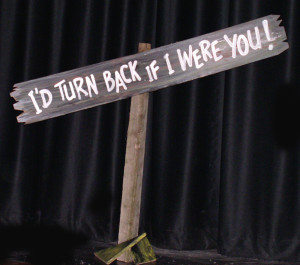
Benediktsson’s book is direct and raw. The first chapter is a list of the top reasons why being a sound engineer sucks. My hope was that he would go through each obstacle line by line and tell me how to overcome it, but instead it reads like a warning. Take a look at the opening passages from the last three books I read and see if you see a theme.
Live sound is difficult, frustrating, has long hours, and often commands very bad pay. Even though mixing live sound might be an awesome job, it’s just a small part of what you do as a live sound engineer. Sometimes running live sound just sucks.
Live Sound Survival by Björgvin Benediktsson
This is not a very nice book…But, it is a truthful one…Every single thing that you manage to acquire comes at a price – usually your own blood, sweat, and tears.
Getting A Foot In The Door by Darryn De La Soul
If you like semi-darkness, long hours of boredom, long hours of work, no social life, no love life, heavy lifting, getting your white gloves dirty, and a good laugh, this is the job for you.
Live Audio by Dave Swallow
And here is the title of Benediktsson’s sales page:
How Can the Worst Job in the World Also Be the Most Fun?
It’s shitty. I get it. If you look back at everything I’ve written on Sound Design Live you will see plenty of examples of me deploring the conditions that live event professionals are forced to endure. I think we all get it. I guess I’m just getting tired of everyone bitching from the rooftops without making any real moves for change. Instead of inviting newcomers to tackle these problems with fresh eyes, we maintain the status quo.
Maybe the duality of the pleasure of musical adventure and the pain of crap working conditions is what makes the job so strange and enticing. Or, maybe we can do better. What do you think Pissy Sound Guy?
I'm gonna build a time machine, travel back to this a.m. and smother myself with a fucking pillow before I get up & come work with this show
— Pissy Sound Guy (@pissysoundguy) May 11, 2014
I'm just gonna turn off all the lights at FOH and hide in the dark. Any new iPhone games I should check out?
— Pissy Sound Guy (@pissysoundguy) May 11, 2014
This article Live Sound Survival: Big Sound Out Of Small Systems appeared first on Sound Design Live. Sign up for free updates here.
P.S.
Learn from the Sound Engineers for Tori Amos, Prodigy, and The White Stripes Online
Learn To Become A Recording Engineer Online
How To Become The WORST Live Sound Engineer Ever

May 11, 2014
Dancehall Sound System and How To Mix Music You’ve Never Heard


 “This guy doesn’t know dancehall.”
“This guy doesn’t know dancehall.”
That’s what the singer’s friend said about me during sound check. We had just started and they were already giving up on me.
That was ten years ago, and honestly, he was right. And if I’d had the balls to ask, that would have been a perfect time to get to know reggae and dancehall. Sure, it would have been hella awkward, but I would have learned something and developed a relationship instead of standing there blushing.
How To Mix Into The Unknown
Prioritize Balance – How much time do you have? If you are walking into a sound check, simply focus on reenforcing the sources that need it, balancing the mix, and asking the band manager or someone familiar with the music to guide you.
Call A Friend – If you have a little more time, phone a colleague who can walk you through the most important elements that the artist is likely to care about. I had to do this with merengue once and my colleague spent some time explaining the central roll of the guira to me.
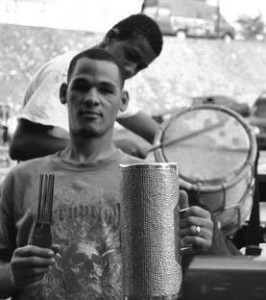
Study Up – The excellent bass guitar play Michael Manring said: “Don’t just listen to the music you like. Also listen to the music you dislike and try to hear the value in it that its fans hear.” How do you do that? Start by contrasting it with your favorite music and notice the differences. What’s the most prominent instrument? For vocal driven music, is it mixed high above the rest like Celine Dion or burried in the mix like My Bloody Valentine? Are there important effects that you need to have ready like a tap delay or giant reverb? Start with what you know and work back from there.
Smile – Being friendly and accommodating has helped me make it through the night on many occasions. I learned to do this by working with other people who had no idea how to help me technically, but who were very polite and professional. Because they were nice and willing to work with me, we got on and made it happen.
So, back to dancehall…
What is a Dancehall Sound System?
Fast forward ten years and I’m researching dancehall sound systems. Why? Because it’s a search term for which I’m likely to rank well, and a little bit because I’m hoping to make up for that awkward moment ten years ago.
The first thing I did was post the question to Quora and Soundforums.net. Then I shared it on Twitter and Facebook to make sure that it would get some replies. Then I read this:
In the context of Jamaican popular culture, a sound system is a group of disc jockeys, engineers and MCs playing ska, rocksteady or reggae music.
Forehead slap. Retrace my steps attempting to delete any evidence that I am as white and out of it as I am. Let’s just keep this secret between you and me, shall we? Thanks.
 So, when people say dancehall sound system they must mean groups of DJs and artists playing dancehall. Thanks, Wikipedia, it’s all making sense. All this time I’ve thought that groups like Buraka Som Sistema were extolling the benefits of playing through a kick-ass sound system. And every time an artist yelled, “Sound system!” I thought they were giving me a verbal high-five. 10 years later and I’m still embarrassing myself.
So, when people say dancehall sound system they must mean groups of DJs and artists playing dancehall. Thanks, Wikipedia, it’s all making sense. All this time I’ve thought that groups like Buraka Som Sistema were extolling the benefits of playing through a kick-ass sound system. And every time an artist yelled, “Sound system!” I thought they were giving me a verbal high-five. 10 years later and I’m still embarrassing myself.
Terminology in music is messy. I never really understood music genres except as an organizational tool for music stores. When I tell people that I’m a sound designer they think I work in film. When I ask for the dykes people look at me funny. Life needs subtitles.
So I still don’t know dancehall, but I’m 99% sure they want more bass. However much I have now, they want more of it. And the next time someone is talking about a dancehall sound system I won’t ask them about their favorite speakers.
Here’s one of my favorite reggae jams. Enjoy.
This article Dancehall Sound System and How To Mix Music You’ve Never Heard appeared first on Sound Design Live. Sign up for free updates here.
No related posts.

May 4, 2014
How To Become The WORST Live Sound Engineer Ever


 Lots of sound engineers want to be great, but you don’t hear much about going the opposite direction.
Lots of sound engineers want to be great, but you don’t hear much about going the opposite direction.
What if you are trying to develop a reputation for being completely terrible?
Björgvin Benediktsson is here to help. Here are suggestions from one of his best posts, 10 Ways to Become the WORST Live Sound Engineer in History, along with some comments of my own.*
#1 – You shouldn’t care about what the band says, your opinion is the one that matters.
I’ve developed a fantastic technique to accomplish this: When an artist says, “Hey, can you X, Y, Z,” I say, “Sure, no problem.” Then I pretend to turn knobs and make changes. “Thanks,” the artist says. “You’re an idiot,” I say in my head.
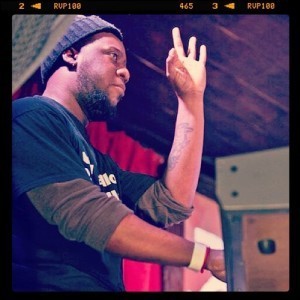 There are lots of easy ways to avoid requests that you don’t agree with. When a drummer asks you to mic their entire kit, you can put up all the mics and connect them to the stage box, but not actually use them. These methods are good for avoiding the artist and their stupid questions. No good can come from trying to understand the root of their problems.
There are lots of easy ways to avoid requests that you don’t agree with. When a drummer asks you to mic their entire kit, you can put up all the mics and connect them to the stage box, but not actually use them. These methods are good for avoiding the artist and their stupid questions. No good can come from trying to understand the root of their problems.
#2 – Never walk around the venue because it only matters how the music sounds by the mixing board.
Listen, there’s no way I can solve every problem everywhere. If the venue wants great sound in every seat then they should have hired a sound system technician! All I can do is be responsible for making it sound good right here, and hopefully it will sound good everywhere el…wait, who am I kidding? I’m just trying to make it through the night without trouble. Don’t hassle me.
#3 – Place the monitors as close to the players as possible, that’s where they’ll hear themselves the best.
I disagree sightly with Bjorgvin on this one: the laziest method would be to leave the stage monitors wherever I first set them. If I cared at all, I would find the optimum listening position to help the performer and keep the stage volume low. But I prefer to just turn some knobs and blast it. Fuck ‘em.
#4 – Make sure the singer gets all the instruments in his monitor mix.
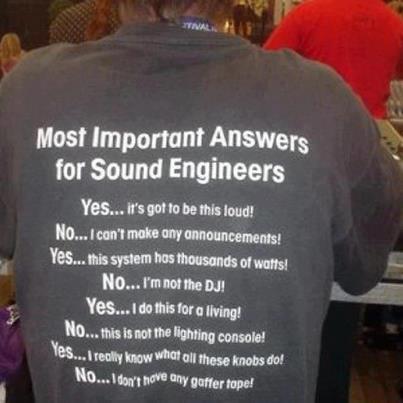 I love this. When an inexperienced singer walks in the door asking for “a little bit of everything,” I know they are unfamiliar with the difficulties of loud stages. From there I only have to smile and nod.
I love this. When an inexperienced singer walks in the door asking for “a little bit of everything,” I know they are unfamiliar with the difficulties of loud stages. From there I only have to smile and nod.
#5 – Never bring extra jack cables. If the players can’t remember their cables, they can’t play.
Is this your first time? How old are you? I’m sorry, do you need me to change your diaper as well?
I also never bring my own headphones. That way every problem with the sound system is forced into everyone’s life.
#6 – Constantly ride the faders so it looks like you’re doing something awesome.
I completely disagree with Bjorgvin on this one. The best way to be the worst sound engineer is to walk away from the console and have a beer. That way, if there is a problem all of a sudden, like a moment of feedback or a musician yelling into the mic, you are no where nearby to catch it. Besides, all the hotties are at the bar.
#7 – Feedback isn’t your fault. It’s the singer’s for wanting so much of himself in the monitor.
I’m not a wizard. If I were, I wouldn’t be here at this show. I’d be back in the shire smoking one of those badass pipes with some hobbits at the tavern.
#8 – Let the guitarists crank up their amps as much as they want. If they drown out the rest of the band, so be it.
I guess if I cared I would put the guitar amps up high on crates or stands and near the players so they wouldn’t need to crank ‘em up. But I’d rather avoid conflict, so I’ll just let them figure it out.

#9 – Show up late to the sound-check. You know the band will too.
Musicians are slackers. We all know they won’t show up on time or be prepared. I could call them the day before to remind them of the sound check time, but that’s really not part of my job description.
#10 – When the show’s over, just throw the cables in the box. No need to wrap them up.
I’m not in tomorrow night. Let the next guy sort it out.
And if you’re short on time, here’s the quickest way to become the worst live sound engineer ever:
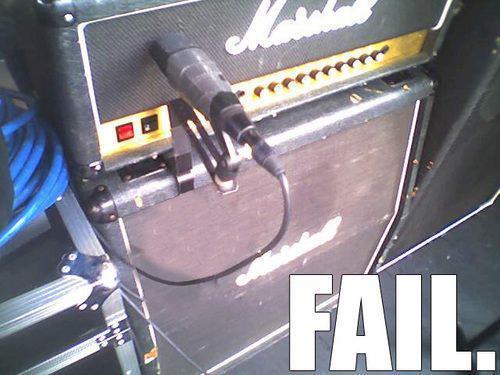
I stole this image from Benediktsson’s post called The Worst Live Sound Mixing Mistake Ever.
* Hopefully you’ve already recognized this as satire. If not, congratulations! You ARE the worst sound engineer ever.
This article How To Become The WORST Live Sound Engineer Ever appeared first on Sound Design Live. Sign up for free updates here.
Read Related Articles:
Make A Living As A Sound Engineer, Part One: How To Get Paid
Make A Living As A Sound Engineer, Part Two: How To Get Played
Sound Design Live Podcast Greatest Hits Volume 1

April 27, 2014
Learn To Become A Recording Engineer Online
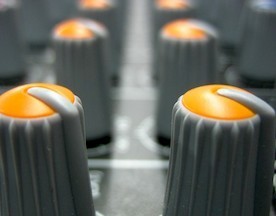

In this episode of the Sound Design Live podcast I talk with the owner of Audio Issues, Björgvin Benediktsson. We discuss live sound survival, website design, and the Potluck Conference. He also talks about the Icelandic language, Sigur Rós, and how to deal with the shitty parts of working in live audio.
Details from the podcast:
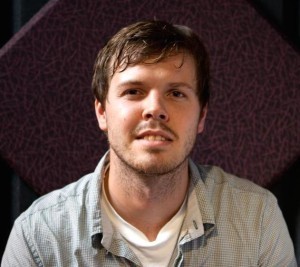 Music in this episode by Pan and The Long Wait
Music in this episode by Pan and The Long WaitBjörgvin Benediktsson on Twitter and Facebook
Sigur Rós
SAE Institute
Eyjafjallajökull volcano
eBooks: Recording & Mixing Strategies, Live Sound Survival
Crowd Audio – The 99 Designs of mixing.
Talent House, eLance
Behringer Zenix
Theme Forest (for WordPress)
NAMM, AES
Potluck Conference in Tucson
Craig Shumaker: Calexico, Devotchka, KT Tunstall, Neko Case
Andrew Sheps: Red Hot Chili Peppers, Black Sabbath
Dusty Wakeman: Mojave
Vance Powell
Michael Romanowski: mastering engineer, Dredg
Quotes:
“Live sound is difficult, frustrating, has long hours, and often commands very bad pay. Even though mixing live sound might be an awesome job, it’s just a small part of what you do as a live sound engineer. Sometimes running live sound just sucks.”
“I’m a big believer in quitting fast if you really know it’s not for you.”
This article Learn To Become A Recording Engineer Online appeared first on Sound Design Live. Sign up for free updates here.
Read Related Articles:
Learn from the Sound Engineers for Tori Amos, Prodigy, and The White Stripes Online
How To Become A Sound Engineer
Sound System Design And Optimization with Bob McCarthy

April 20, 2014
One Simple Reason I Chose To Be An Audio Engineer Major
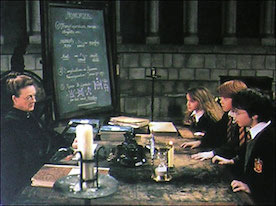

 I didn’t have to go to college, but I’m glad I did. It was fun as shit.
I didn’t have to go to college, but I’m glad I did. It was fun as shit.
There is nothing to stop you from calling yourself an audio engineer and making money at it without a degree. Most people just fall into it in one way or another, so why bother going to school?
‘Cause…fun. That’s the reason I chose to pursue a degree. So I guess that’s it for this post, thanks for reading!
No, not really. I also discovered a powerful form of creative expression and a marketable trade.
Honestly, I feel sorry for anyone that didn’t have a blast at their university. I loved mine. I did suffer at times in some of the academic courses, but I’ve always enjoyed learning, whether it’s about mixing boards or philosophers. But there are plenty of reasons why an audio engineering major is fun even if you’re not the kind of person who likes school.
Practical Application
The main reason that an audio engineering major was so exciting to pursue was that I was dying to learn how to do everything, and the program at City College held the only cure. I am a musician & songwriter (yes, I have a CD!), so I couldn’t wait to learn how to compose music in Logic and record other people’s bands in Pro Tools. I was a giant sponge soaking up every little piece of information that came my way, every single day of my college career.
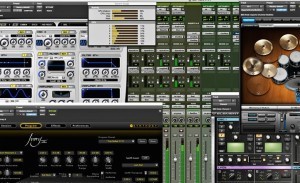 In my first year at the Sonic Arts Center, we learned everything about MIDI and sequencing. I came in knowing almost nothing and by the end of the year I was composing all of my music in Logic. In the second year we learned about recording acoustic music and using Pro Tools. I fought it at first, but whereas it took a month to master Logic, it only took two days to become a Pro Tools power user. By the end of the year I had a couple of regular hip-hop clients and the occasional rock band. And we didn’t just use the school’s recording studio, we had tie lines and access to every performance space in the music school, 24 hours a day.
In my first year at the Sonic Arts Center, we learned everything about MIDI and sequencing. I came in knowing almost nothing and by the end of the year I was composing all of my music in Logic. In the second year we learned about recording acoustic music and using Pro Tools. I fought it at first, but whereas it took a month to master Logic, it only took two days to become a Pro Tools power user. By the end of the year I had a couple of regular hip-hop clients and the occasional rock band. And we didn’t just use the school’s recording studio, we had tie lines and access to every performance space in the music school, 24 hours a day.
Project Based Grading
The second reason that my audio engineering major was so fun is that I never had to worry about passing. I barely passed my physics final because of the intense exam, and I almost didn’t make it through philosophy because of all the writing we had to do, but in my audio engineering classes all we had to do was make music. My compositions weren’t brilliant, but they demonstrated my mastery of the subject we were working on and that was what mattered. I guess I should have asked my physics professor if I could test out with a song.
We did have tests, of course, but they were full of critical audio information that I needed to be creative. I’m not knocking physics, because now that I am a lot more interested in sound system design and optimization, my desire to understand the science of audio has increased and I’m sure I would do much better in that course if I took it now. At the time I didn’t see a long-term benefit to learning physics, but the immediate need to learn audio engineering skills was right in front of my face. It was the only thing standing between me and rock stardom!
But…$$$?
 So now you might be thinking, OK, that sounds fun and all, but I bet it cost a lot of money. I could just have fun at a strip club with that money instead.
So now you might be thinking, OK, that sounds fun and all, but I bet it cost a lot of money. I could just have fun at a strip club with that money instead.
Here’s the thing: you have to educate yourself somehow. You can read books, take online courses, or go to a university. You can even work and get on-the-job training while you do this, but one doesn’t replace the other. You need both training and work experience. Plus, you’ll get a lot more enjoyment out of your work if you understand it at a deep level.
My tip? Go to a cheap school. The City College Of New York is about $3,000/semester compared to private schools nearby like Columbia or NYU that are about $23,000/semester. Some of my friends are still paying off their loans from those more prestigious names.
It doesn’t make sense to go to an expensive university unless it has a stupid-famous name like Yale or Harvard, and even then no one cares about that in our business. You are only as good as the work you produce.
How To Choose An Audio Engineering University
1) Are you a musician?
 Every university is a little bit different. I applied to ten different schools that offered a four-year degree program and noticed a few themes. The first is that most audio engineering majors are part of the music program. That means you will take required courses in music theory, musicianship, voice, piano, etc. This was great for me, but it might not work for you. Also, be aware that some schools require that you major on a specific instrument. That means that you will have all of the requirements of the normal music majors plus your audio engineering courses. For me, that would have been overwhelming, but some of you might be badass like that. I know it wouldn’t have worked out because I spent my first year at North Texas studying jazz guitar and could barely keep up. Similarly, some schools require that you study electrical engineering along with audio. Some schools will even let you design you own degree program. Ellen Juhlin talks about doing this at Carnegie Mellon in my interview with her.
Every university is a little bit different. I applied to ten different schools that offered a four-year degree program and noticed a few themes. The first is that most audio engineering majors are part of the music program. That means you will take required courses in music theory, musicianship, voice, piano, etc. This was great for me, but it might not work for you. Also, be aware that some schools require that you major on a specific instrument. That means that you will have all of the requirements of the normal music majors plus your audio engineering courses. For me, that would have been overwhelming, but some of you might be badass like that. I know it wouldn’t have worked out because I spent my first year at North Texas studying jazz guitar and could barely keep up. Similarly, some schools require that you study electrical engineering along with audio. Some schools will even let you design you own degree program. Ellen Juhlin talks about doing this at Carnegie Mellon in my interview with her.
2) What audio engineering program gives you the most studio time?
Another common theme is that every student in an audio engineering major gets a certain amount of studio time. This should be an important factor in which program you choose, because you will only absorb as much information as you can quickly put into practice. With each new subject you’ll be banging the door down to get your hands on the gear, I promise. Smaller programs like the one I went to will get you upwards of 6-8 hours each week, which is great. Then you can sign up for extra time on the weekends and team up with other students to block out whole days for a serious recording session.
3) How many of their graduates got jobs?
The last criteria that I think you should be judging these audio engineering courses on is how many of their graduates are successfully employed? Like me ten years ago, you may think that you’ll be the best record producer in the world and nothing else matters. Enjoy that fantasy while it lasts! The truth is that we all need help when we’re starting out, and one of the best parts about going to school is the connections you make there. It’s almost like you are paying the professors to get to know you so that they will point you in the right direction and connect you will the right people.
I have to admit, the Sonic Arts Center did not do that for me. One reason they weren’t helpful was that I moved to Portugal soon after graduating, but more importantly they did not have a viable internship or job training program set up then. Fortunately they now do. Before I went for my first campus visit, my dad said, “Make sure to talk to some of their recent graduates and see if they are getting jobs.”
SHUT UP DAD GET OUT OF MY ROOM! [*slam*]
Sorry, where was I? Oh yeah, make sure to ask about each school’s job placement program and see if you can get in touch with some recent graduates to ask about their experience with the program. The school should bend over backwards to make that information available to you.
Remember Nevin Steinberg? He strategically chose his jobs after school to work with sound designers he knew would help him get more work down the line. Remember Darryn De La Soul? She made it her life’s mission to put her students in every music venue in London. Isn’t that the kind of person you want to train with?
Conclusion
I read somewhere as a freshman that you should choose your degree program as though you were going to die the day after you graduate. It seems morbid, but it’s a good way of choosing a path that will make you happy. That’s what I did. I wanted to learn how to record my music and do the same thing for others, and it was incredibly rewarding. It was an added bonus that I learned a trade and started making money before I even graduated.
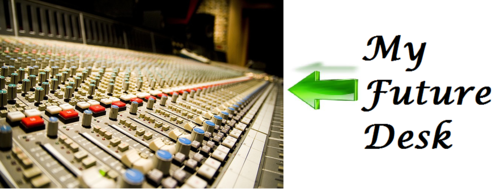
If you have any more questions about the program I went through or audio engineering majors in general, comment below.
This article One Simple Reason I Chose To Be An Audio Engineer Major appeared first on Sound Design Live. Sign up for free updates here.
Read Related Articles:
Balls Of Steel: 10 Surprising Tips For Live Audio Engineer Training
The Best Search Engines For Sound Engineer Jobs
Best Tips For Building A Career In Pro Audio

April 13, 2014
Balls Of Steel: 10 Surprising Tips For Live Audio Engineer Training


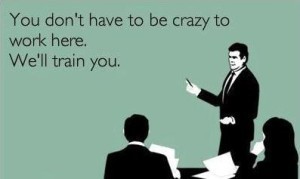 In the live industry, audio engineer training happens on the job.
In the live industry, audio engineer training happens on the job.
You’ll never take a college class on how to load a semi. You’ll never have to bribe a union forklift driver at the academy.
In general I believe it’s pretty easy to get started at this job, but a lot harder to stick with it. I even said so in How To Become A Sound Engineer: ”anyone can become a sound engineer. Getting your foot in the door is easy, but it can be difficult to move up.”
Simple, right? Except if you are that person trying to get your foot in the door for the first time. Then you might think I’m full of shit.
10: The truth hurts?
“This is not a very nice book…But, it is a truthful one.”
Right out of the gate Darryn De La Soul prepares you for pain. In her free eBook Getting A Foot In The Door: How to make your way in the Live Sound Industry, she paints a pretty bleak picture of working in pro audio. I don’t agree with her on this issue, but I respect her and what she has to say. Her experience is based on a decade of touring and doing shows.
I disagree because I’ve worked in places that have much lower barriers to entry and demand much less sacrifice than the ones she talks about in her book. I’m not going to dive into that right now, but those places can include jobs in theatre and corporate AV, for example. My theory is that De La Soul has spent so much of her career working concert sound and helping others do the same that the entire industry looks like an uphill battle to her. I can’t fault her too much for her approach because the people coming to her for help want to mix the next U2 tour, so the first thing she has to do is a reality check.
9: Climbing the career web
Unlike many careers, such as banking and law, there is no ‘ladder’ in the Live Sound industry; it’s more like a web, only a web that has a lower end and a higher end.
This is my favorite section of the book, because it puts into words something I’ve been trying describe for years. If you want to be an electrician the ladder looks like this:
Training School
Assistant
Apprentice
Journeyman
Master electrician

If you want to be a sound engineer the ladder might include any combination of training schools, assistantships, apprenticeships, part-time jobs, full-time jobs, and working for free for friends. But you can cut through all of those by getting your own clients. You might also have a job in audio, but still need or want a second job, so it’s never black and white.
This giant gray area is the reason it can take so long to get rolling after you move to a new city, even though you have years of experience. If you use it right, it is also a means to save yourself a lot of time, make the right connections, and launch yourself into the higher end of the web.
8: Audio Engineer Training Qualifications
Most of the degrees out there don’t really mean much because they haven’t taught you how to push the boxes and load the truck and be awake for 15 hours and still have a smile on your face.
No certification is required to call yourself a sound engineer. Again, this is good and bad. You may be able to excel very quickly at a job through hard work and aptitude, but the status you gain is generally not portable.
That being said, there are some qualifications that help. If you come in with a rigging certification, that’s badass and not very common. More on that in a future post. Also, everyone should be CPR and First Aid certified.
7: A bit of a dick
Be likeable.
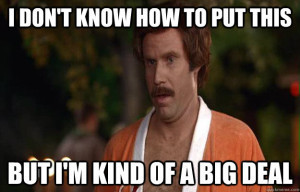
This is the most helpful, yet the most abstract audio engineer training advice De La Soul gives in her book. Without certifications or a clearly defined career ladder, first impressions are all we’ve got, unfortunately. How do you create a good first impression? Read The Charisma Myth, and thank me later.
De La Soul goes on to cover other helpful ways of being that are all immensely helpful. Our industry has a reputation for being disorganized and unreliable. When is the last time you went to a concert that started on time?
Being punctual and reliable will make you stand out by contrast.
6: How to look good on your first job
Two words: Tight pants.
Just kidding! I made that one up.
De La Soul gives a whole list of suggestions for how to be valuable on the job here, but I’ll tell you a secret right now. I can always identify the inexperienced techs because they stand around waiting for someone to say go. As soon as you get in there, start putting together the missing pieces. If it’s not clear, ask whoever is in charge. If you’re really sharp you will ask for the next three steps and write them down so you won’t have to keep coming back for more.
5: Pushing Boxes
Seventy percent of the job is…loading trucks.
Goddammit, I hate load-in and load-out. Why didn’t I just become a flute player?? My suggestion is to ask someone more experienced, “What’s the best way to lift this?” and “Is this a two-man job or can I get it myself?” You’re not going to be the superstar you want to be with a blown disk.
4: CV, Resume, Cover Letter
De La Soul spends a couple of chapters talking about how to get these three things right. Only once have they ever gotten me a job. If it’s not a posted position, just go there. If you can’t, call. If all else fails, email. Repeat as necessary.

3: Now that you’ve got the job
Respond to messages and emails promptly.
Employers, clients, significant others: everyone looooooooooooves this. If you respond quickly, clients will start contacting you first because they know you will get back to them right away, but will take Molly Molasses two days to respond. I’m not the best role model, but a good practice I’ve developed is to write people back immediately, either with the answer or to let them know I’ll need more time to answer.
You MUST have public liability insurance.
This was a surprise to me. Apparently in the UK this is a deal breaker. I’ve never had it and have almost never been asked about it. In my interview with Stephen Fishman he didn’t think it was necessary since a lawsuit would most likely be filed against the venue owner or event organizer, who are more likely to have the $$$. When I talked to Jim Digby from the Event Safety Alliance, he said to err on the side of caution and get protection. I’m still unclear so I am going to do more research and write a future post with better advice for the US audience.
2: It’s worth a Google.
First thing just about anyone does these days is ‘Google’ you; so make sure your Internet presence says only good things about you.
I disagree. I’ve spent a lot of time building an online presence. It’s done good things for me, but it’s never gotten me a job, or stopped me from getting a job. I would love to change this, but at the moment, it’s just not how things work, at least in the US.
1: Taxes!
I personally found that if I saved 10% of each and every job, that equalled – more or less – the amount of tax I owed after I had offset my business expenses. Start saving those little bits now.
Where were you when I needed to hear this ten years ago?! Pfff…
For more on this please read The Sound Engineer’s Pain-Free Guide To TurboTax.
Conclusions
Although De La Soul’s frightening description of a career that demands “total dedication and balls of steel” might turn you away, remember that it’s still just a job. Jobs are very important, but like everything else in life they are what you make of them.
So, if you want to bust your ass interning at a recording studio for thousands of hours waiting for a break, you can do that and it will have its rewards. But you can also get a full-time job at a corporate AV company tomorrow, and it will have different rewards. Every career and audio engineer training path is unique. Don’t try to be Darryn De La Soul or Nathan Lively. Those two are taken and cannot be repeated. You do you.

This article Balls Of Steel: 10 Surprising Tips For Live Audio Engineer Training appeared first on Sound Design Live. Sign up for free updates here.
Read Related Articles:
Learn from the Sound Engineers for Tori Amos, Prodigy, and The White Stripes Online
Best Tips For Building A Career In Pro Audio
The Best Search Engines For Sound Engineer Jobs




